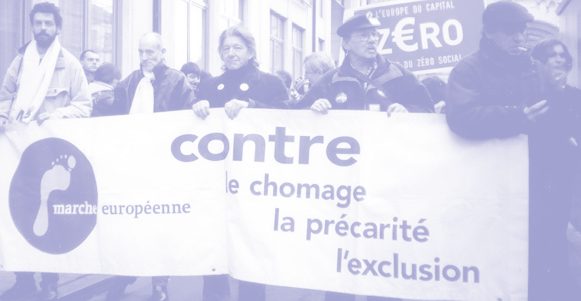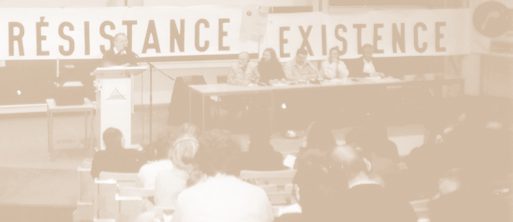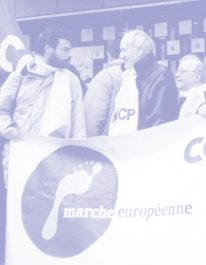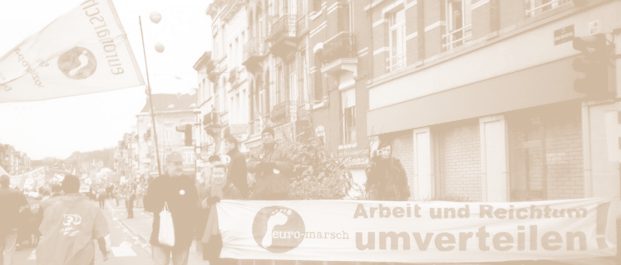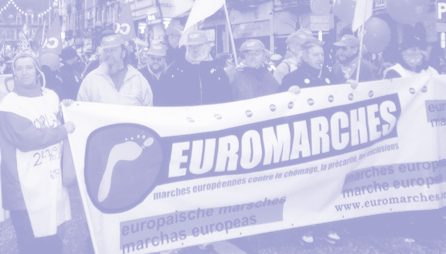|
Germany: Euromarches,
Unemployement organisation of Köln,
German Migrant organisation
Holland:
Euromarches
French:
Euromarches,
AC !, Apeis, MNCP
Belgium:
Euromarches
(Absent: Austria, Greece, Italy, Spain)
Agenda:
- Preparation of the counter G8 summit: Where things are now.
- Marches to Heiligendamm
- European Conference to prepare the counter-summit
- News from the different countries
- Athens
- Vienna
- Calendar, who will do what?
- Precarity Network. FSM Nairobi.
Saturday the 24th
In Athens, during the Assembly of the unemployed organised by the
Euromarches, was proposed the organisation of a European wide network
against precarity.
A meeting will take place at the next European preparatory assembly this
autumn.
The success of marches to Heiligendamm will depend on the realisation of
this proposal.
The region of Heiligendamm has acute social problems. The summit will
take place on 8, 9,10th June in Rostock: Rostock is an old town and is a
centre of German working class struggle.
The preparation of this march is advancing: on a national level there
should be a wide coalition around the autonomous left, the NGOs and
other organisations.
Preparation meetings have already happened. Already we know that:
- There will be a counter summit
- There will a big demo (around 100 000 people expected)
- There will be a big cultural event which has to be finalised.
A European Conference will happen in October for the preparation of the
counter summit. It will be built as a truly European event,
representative of European civil society.
A meeting concerning the G8 counter summit happened at the Athens ESF,
and in the ESF final declaration it was stated that this counter summit
was a priority.
On the local level: this 14th July 2006 G W Bush will be visiting the
area. So there is a big mobilisation against his visit and security is
very tight. At this time the region is locked down. It is possible that
this time next year this area will be declared a security zone again.
This will have an influence on any march we plan. Bush has been invited
by Angela Merckel and this ‘invitation’ will be focussed on.
Concerning the counter-summit: there is going to be a demonstration of
migrants on Thursday 7th of June 2007, as at G8 in Edinburgh, Genoa etc.
On the Friday the counter-conference will be held.
On the Saturday there will be a big demonstration, and on Sunday other
activities which still need to be decided.
Other ideas will be discussed later, starting with the meeting on Sunday
25th of June
(More details on www.heiligendamm2007.org)
Will there be any demos at the end of the German presidency of the EU
around the middle of June next year?
Unlike in Cologne G8 there will not be an opportunity to have two
demos. So those of the counter G8 will crystallize the two.
Attac think Angela Merckel may attempt to use this occasion to try to
re-launch the EU constitution.
In France, No Vox is very interested in the marches to Heiligendamm, as
a way to increase the visibility of the have-nots. This network already
works with Euromarches. The World women’s march is also very interested
by this.
The idea, which has become a real concrete project, is to form the
marches and the caravans around three weeks before the summit demo in
Germany
Overtime the caravans will become the march.
What are the possibilities of welcoming the march in the region? During
certain marches the accommodation for 500 people had indeed to be
organised...
A few routes have been suggested:
- From Finland to Rostock
- Russia- Poland towards Rostock. In Poland notably Euromarches contacts
may be interested in participating.
- From Greece across the Balkans
- From Portugal and across Spain (No Vox Network)
- From France and Belgium.
These projects are still vague: we need to precise them. The money must
be found and information received about the capacity to welcome the
marches in Germany.
Each march will be self financing with the help of the countries
crossed; a place of coordination must be put in place with telephones,
computers, with people permanently present (media teams etc.) to follow
day by day the evolution of the different marches.
These marches in Europe will depart around the 17th May.
We’ll have to find out as soon as possible which town could participate
concretely in those (possibility of food, accommodation for the marchers.
G8 and Marches
For the moment the financial questions haven’t been discussed deeply in
Germany. Attac could contribute up to 10 000 Euros.
Other organisations which will participate are Oxfam, and Justice Now
A camping site near Rostock has been proposed. Some German Trade Unions
haven’t signed up yet (lots of tension between them.) They will soon
have to concretely get on board!
Concerning the Marches: each march needs to find its own finances,
through Attac National for instance, trade unions also for example.
The European Preparatory Assembly in September will bring together all
the organisations of struggle against precarity, which will meet on the
Friday.
This question of the marches will be covered.
It’s probable that the project will be greeted enthusiastically; already
some trade unions are involved in this coordination (The Italian FIOM,
the Spanish CGT, and Solidaires in France.)
The question nevertheless is to connect the marches to the G8 demos. A
German team will be needed to take care of the material requirements,
towns to welcome people, accommodation and food etc.
The European Preparatory Assembly and the G8 European Organising
Conference should not coincide, so that things can be cleared in term of
the organisation of both events.
It will also be important for the organisations of the struggle against
precarity to hold a meeting on the subject of the anti-G8 2007 during
the next EPA.
A peace Caravan is going this summer between Paris and Moscow: 2 people
from the Euromarches will be walking. We need to contact the Portuguese
who are themselves organising a march in September. It is important to
follow these initiatives for the preparation for the G8 marches. A clear
objective needs to be formulated for the marches.
Demands need to be formulated in line with our common perspectives e.g.
in relation to a basic income...
Three meetings will be held during this Conference:
- The counter-summit
- The marches to Heiligendamm
Euromarches will make a thematic contribution to the conference, as well
as the project of marches.
We need to work on the content of our contribution: guaranteed income
cut in working hours, refusal of growing social insecurity...; to put
forward the work that was fruitful within the Euromarches...
We need to talk about a new balance: access to an income, to health,
education...
We also need to speak in positive ways and find ways to express positive
demands:
Let’s act together against unemployment and precarity!
Samer right for all !
Stop precarity !
A steering committee will be put in pace after this Köln meeting to
follow the marches and this event...
Calendar and routes
In order to arrive in Rostock on the 7june, the marches will have to
start around the 17th may.
We have exchanged different ideas about routes: they will be finalised
soon, as well as convergence points in Germany and elsewhere.
We also need to find routes starting from North Africa (in the Social
forum the social network converges, so the idea seems quite reasonable!)
and the South.
In Germany the Marches should converge to march together to the
migrant’s demonstration on the 7th June. This German route is essential
and needs to be prepared carefully. A working group has to be organised
in the Rostock European Conference.
We need to contact: after the No Vox meeting in Paris the 8-9 July,
after we know the date of the next EPA, after the results of the 25 th
June meeting on the G8, after the Saint-Petersburg G8:
all the organisations fighting precarity which met in Athens.
Organisations we know elsewhere.
Angela will send a report about the decisions taken in the different
meetings.
Saturday 24 June, 18h
Belgium (presentation given on Sunday)
On the level of the unemployed movement nothing new is on the horizon.
For three months there has been an important sans-papiers struggle. The
Home Office Minister has refused to regularise them, but discussions are
taking place.
There have also been very serious incidents recently: two racist
murders, a black woman in a coma, and an attack against political
prisoners. There is a renewal of the far right.
On a political level, affairs at the heart of the socialist party on the
eve of the elections
are dominating the news
In Belgium, there are very few forces, to the left of the socialist
party, which risks giving power to the far right. There are elsewhere
debates at the heart of the two big trade union organisations, to ask
for a ballot
Since the beginning of the Euromarches the SDF (the homeless) have been
participating in the movement. They have changed and are taking there
lives in hand. They continue to participate in the forums but are not
enough involved and given enough chance to intervene.
Germany
There is a resurgence of the far right in the old East Germany. They
have got into parliament in Saxony (NPD).
The NPD promotes slogans such as « work for Germans » and they are
profiting from mass unemployment to popularise their ideas .They promise
to put in place measures for youth unemployment and they look to present
themselves as respectable.
On the social level, there is a fusion of employment agencies; the
situation of the unemployed movements is difficult.
There has been for a few days a preparatory assembly for a new German
social forum which will take place in October 2007, probably on the 20th
between trade union congresses. It may be a little small as it follows
the G8 counter-summit and the marches.
It will take place in the east of Germany so it will be difficult to
mobilise in the West.
There is also another problem that unemployment is out of control and
there is a great sense of resignation in the region.
On the bright side the position of the meeting on the border will let us
focus on the subject of the Eastern countries.
Holland
The Dutch Social Forum took place at the beginning of May. 200
organisations participated. The goal was to reinforce the links between
different struggles. It’s regrettable that few migrant organisations
took part in the forum. This forum was the second Dutch social forum:
what was at stake was to find common fields of activity and of
collective reflection. The official media were completely absent; the
European level did not play a big part.
The Euromarches organised a seminar in which Frank participated. A
leaflet was made by the coalition around this social forum.
Germany
It’s necessary to well formulate our demands for a European guaranteed
income.
France
These last months have been marked by a battle against the « equal
opportunities law » (loi sur l’égalité des chance.). The battle was
mediatised through fight against the first employment contract (Contrat
Première Embauche.)
The struggle of the people most affected, joined by trade unions was
finally victorious, resulting in the withdrawal of the contract;
nevertheless the law as a whole was passed which makes this a
semi-victory. In that law figured notably apprenticeships for 14 year
olds. The CNE (New Employment contract), mother of the CPE is still
being applied.
The control of the unemployed has toughened ; with notably then putting
in place a monthly control of unemployed people , which has been
denounced by the Job centres (ANPE) trade unions.
Present politics are marked by scandals, the Clearstream affair, and the
Presidential campaigns of 2007 but above all, at the moment, by the new
immigration (Ceseda) law proposed by Sarkozy.
Resistance is organised above all around the young sans papiers in
schools; a network has been put in place to obtain the regularisation of
the student Sans Papiers and their families... The network is growing
and is spreading across a large part of the country, reacting to
deportation attempts and often leading to the blocking of the
deportation machinery.
United Kingdom
The unemployment figures being claimed for the United Kingdom do not
include those on incapacity benefits. The figure of between 4 and 5%
unemployment does not include the massive increase in numbers of people
claiming sickness benefits. This number has increased from 770,000 at
the end of the Thatcher years to 2.7 million today. This figure is 4
times higher than in Italy, or for example two and a half times more
than in Germany.
What we make of these figures requires a great deal of research. In
fact, looking at the debt ridden society that Britain has become with
its long hours culture and high cost of living, it is not hard to
believe that high numbers of people have become ill as direct
consequence of their working and living conditions. However the
government has come to a different conclusion and now proposes radical
steps to reduce its incapacity benefits bill.
Until now the high incapacity figures have however worked in favour of
the government who like to champion their miracle economy and low
unemployment across Europe.
The government has decided that the cost of people on incapacity benefit
to the exchequer is too high: incapacity benefit recipients receive
110.85 euros a week… The unemployment benefits (jobseekers allowance) in
the UK are not related to wages, and are set at different rates for
those under and over 21; the standard amount is the equivalent of 81.6
euros per week.
However it faces a dilemma how does reduce this bill i.e. get these
people off their benefits without increasing the unemployment figures of
which it is so proud.
It has come up with a carrot and stick solution. This ‘activation’
solution aims to save 10 billion euros and remove one million people
from sickness benefit and another million single mothers into work. This
is outlined in its European national action plan.
The discourse being used to achieve this is devious to say the least.
First they say that access to employment is a human right that should be
everyone’s and that and that incapacity should not prevent people from
working. This fits into an overall policy that is widely applauded which
aims to help people for example with learning disabilities gain access
to the labour market and lead more ‘normal’ lives.
So thus people are now obliged to attend job interviews, if they do not
accept these generous incentives to return to work then they will have
their benefits reduced by 30% .Currently Doctors are protesting these
reforms saying they do not wish to become government agents in this
process. A 30% reduction will reduce people’s benefits to the level of
unemployment benefits. Thus the government can succeed in reducing
benefits to that level without the recipients changing status thus
increasing unemployment figures.
If we include the numbers on incapacity benefit this places the
unemployment figures in the UK at 8.8 % of the working population. As
well as this if we factor in the numbers of people entering part-time
employment (which is the majority of the employment created in the
United Kingdom since 1997) and hence removed from the unemployment
figures the representation of Britain as a miracle economy looks highly
suspect.
There is reaction to these reforms but it makes few demands.
The workfarist model was invented in the United Kingdom. There is
little defence of unemployed people in the United Kingdom. Access to
benefits is dependent on efforts that have been made to find work. All
political discussions and the general media talk about benefits in terms
of rights and responsibilities. Work is sacred. Benefits are denied if
a ‘client’ refuses a job. Figures are unavailable for the numbers of
people whose benefits have been cut. Low wage jobs and part time and
short term contracts have increased dramatically. Low incomes are
supplemented for families, but not for individuals by a system of tax
credits. A high proportion of people are thus working in low paid,
‘zero-hours’ contracts. The numbers though are largely unknown for they
do not of course feature in the Unemployment figures.
Sunday 25th June
Athens happened, which is positive, considering the important rivalries
in the Greek organising committee.
The social forum was also a lot more open to the Balkans and Turkey than
the previous events
The atmosphere was good, with no special tensions...
In the end, always in the positive, the demo was real success even
without the presence of the Greek communist Party.
This forum has possibly played a real role in the big movement against
privatisation of the Universities which occurs in Greece at the moment.
There are positive and negative in the European dimension of this last
European forum: there was no process of self organisation of the
seminars, which number was reduced from 450 to 200.
Seminars merge very late: different components of the seminars finally
merged sometimes minutes before the seminars, which provoked also
translation problems.
(The Babel network continues nevertheless to develop its capacity. The
system was a lot less expensive; more than 9000 translators participate
today...)
Often the seminars didn’t succeed in uniting more than one or two
political groupings or trade unions and weren’t really that open.
The Euromarches had seminars which gathered around 200 people with a
dozen of different political opinions within each seminar. Our seminars
became little plenaries in which there wasn’t much interaction with the
room (except in the assembly of the unemployed and precarious, but the
debate was yet not sufficient...)
Another limit of the forum concerns the will to move forward with a
European Charter to answer to the rejected constitutional project.
Many seminars spoke about this charter, but nothing concrete came out of
them.
A new conference will happen before the end of the year to discuss
this question.
Athens thus showed the need for and the utility of the Social Forums,
the question remains to be answered where the next one will take place.
The Euromarches were represented by 15 and 20 people coming from the
Athens Forum.
Last year’s idea was to march from Athens to Vienna; but the timing of
the Forum changing stopped that happening.
The alternative Latin American summits brought together a great number
of South American countries, Haiti and Cuba
There weren’t many Europeans except Austrians
A common text prepared on the boat was read by the Euromarches and No
Vox at the beginning of the alternative summit.
The goal of the summit was to denounce the European multinationals,
Water, Banks and Energy companies which are very involved in
exploitation and destruction in South America. The idea was to put them
on trial.
There wasn’t any real judgement made and in that the conference failed.
Among the Latin American representatives there was a good representation
of indigenous people, which was felt in the seminars concerning the
countries of the south.
The discussions were also about the hand of the USA in South America and
on their will to change the politics of each country i.e. in relation to
oil in Venezuela and to impose new forms of economic relations.
In the plenaries the interventions were very balanced: equality between
European and South American participants, men and women.
The rejection of the European constitution; the CPE and European
struggles have had a real resonance in South America, discussion
happened on this in Vienna.
The final declaration concerned the relationships between our two
continents. The counter summit was close by a party in the Arena. Chavez
chose to come to this event rather than to go to the official event of
the Summit.
On the last day, the Saturday, Chavez and Morales also participated in
the counter festivities
The first date (the European Conference) will be at Rostock 6, 7,8th of
October; it will be limited to the planning of the three days around the
summit in June 2007.
But the idea of the marches will star to be organised at the next
European preparatory meeting. It will probably happen at the end of
September, we don’t know where yet. There will be a discussion in France
at the end of the week to discuss this.
This preparatory assembly is important, for the consolidation of a
European coordination of the struggles against precarity but also to
take in hand the planning and organisation of the marches.
In Paris on the 8th and 9th of July will take place a meeting of No Vox
where this subject will be covered. There is also be a meeting planned
in Germany on the same subject.
We have to bring together organisations which represent real forces; but
we also have to guarantee at the heart of the organisation a solid base.
Bearing that in mind, the list of the organisations which will take part
and organize is open and needs to be enlarged.
4) The Bolkenstein Directive
Bolkenstein : la coordination doit être élargie pour prévenir
l’application de la directive.
Il est prévu que les rapports sur la santé, la vieillesse, les services
à la personne soient fondus dans le même rapport que le plan national
d’action. Celui-ci se réduit sur les questions d’inclusion sociale.
Le Conseil européen continue avec ces rapports, mais la lutte contre la
pauvreté va devenir de moins en moins concrète à cause notamment de la
fusion de ces différents rapports.
Il y a aussi discussion sur les fonds structurels européens : le
financement de la politique de l’emploi va être réduit (jusqu’à présent
les fonds structurels européens finançaient jusqu’à 90 % cette politique.)
Dans le dernier rapport allemand 1 page sur 75 était dédié aux questions
du chômage.
It is going to be applied in each country through National action plans.
The coordination has to be enlarged to prevent its application... It’s
called ‘The European services directive’. It’s foreseen that the reports
on health and on old age will be founded on the same principles as the
National action plans. This will reduce the questions of social inclusion.
The European council is continuing with these plans, but the struggle
against poverty will become less and less concrete as the different
plans merge together.
There is also a discussion on the structure of European funding; the
finance of the politics of employment will be reduced. (Until now 90% of
the funds for these politics have been provided by the European
Structural funds.
In the last German report pages 1-75 were dedicated to the issue of
unemployment
5) The European Union
* Loss of the legitimacy of the EU
The French and Dutch NOs to the constitution are irreparable.
Moreover, they disagree on certain policies regarding energy, Airbus and
in other areas.
The difficulties are though that the social movements haven’t reacted
after the victory of the NO and they haven’t acted against this crisis.
They, on the contrary, use this crisis and they are waiting for the
elections in France; they continue also to lead the politics (such as
the last directive on social services and general interests.) They
explain the NO through the question of security the fears of citizens in
relation to their fears about the illegal immigration and they also
benefit from the social movements inability to react.
One positive development of the last social forum was the campaign for
public services in Europe: it’s a defensive campaign which aims at
stopping the machine.
In parallel, the social democracy at the EU parliament has formulated a
project of directive; the European Public services trade-union leads a
campaign trying to give a definition of public services on the European
scale. A campaign for the defence of public services was started in Athens.
It’s difficult to link these campaigns!
Apparently France and Germany agree to look again at the constitutional
process. So the social movements have to prepare a counter proposal.
* On the subject of the 5th meeting on poverty which will take place in
Brussels
More and more people who are fighting poverty are participating.
The sixth meeting will take place next year under the German presidency.
It’s necessary for those most affected to speak out. The far right are
gaining ground in the social movement. Racist murders and hate crimes
are also happening in Germany, and in fact throughout Europe.
On the theme of poverty it’s difficult to get people to express
themselves. The witness of people through charitable organisations has
begun but its necessary to go a lot further; addressing the shame that
people feel which stops them speaking out is important.
We have to give people the chance to speak out, to get out of this
culture of blame. At Charleroi Denis says the important thing is to tell
people they are the experts and that we are able to work thanks to them
often gives them the strength and courage they need. We have to stop
getting experts to speak out in their place.
People often don’t want to speak to the media so as not to be used and
manipulated by the media.
This project came out of the seminars initiated by the Euromarches at
Athens.
The point was made that since the precarity of life, homelessness,
unemployment and precarious work etc. are increasing. Now a coordination
of the struggles against precarity which until now has been fragmented
is necessary.
Criticisms have emerged on the idea of a new network (No Vox) because
the trade unions haven’t been very active until now have decided all of
a sudden to get involved.
A meeting will take place at the next preparatory assembly to better
define this network. In this coordination No Vox and Euromarches
definitely have a place to take up.
We have to see that this coordination will be involved in the marches
and see if a real effort will be made.
We will also have to pay attention to the action of the trade-unions
locally at the side of the first concerned.
7) The World Social Forum in Nairobi
After Bamako we now know people in Nairobi. Two tickets may be financed
for two people from the Euromarches. There will then be the possibility
of organising a seminar.
The theme: »Unemployment and migration« could be very useful to find a
position with Africans on these subjects.
8) Euromarches
On the European level the Euromarches is an informal network.
Euromarches is a concept but we have to advance in the formalisation a
European organisation.
The coordination is a kind administrative council. (CA) The French
status was made in 1997 and has to change. We have to propose a new
status, and a make a list of European participants. Although there
hasn’t been too much enthusiasm so far about this kind of thing, it’s
becoming essential to talk about this.
Explanation of structure
In some countries there is a Euromarches organisation; in France AC!,
APEIS, MNCP are in the network but this network has no statute. It’s the
same in Holland. In the statute of these organisations there is no
reference to their memberships of Euromarches.
In Germany the situation is different as the Euromarches is an organisation.
The MNCP is part of two networks: the Euromarches and the European
Unemployed Network; it wants to make links between the two, and see the
possibility of making the two groups converge.
How do we reorganise Euromarches, bring it up to date making it easier
to get money?
We need to look at the legislation of each country to find out where it
would be easier to set it up a headquarters. In order to make a proposal
it is necessary to investigate so that at the next meeting we can
discuss the legal particularities of each country.
Report established by Tom
|


